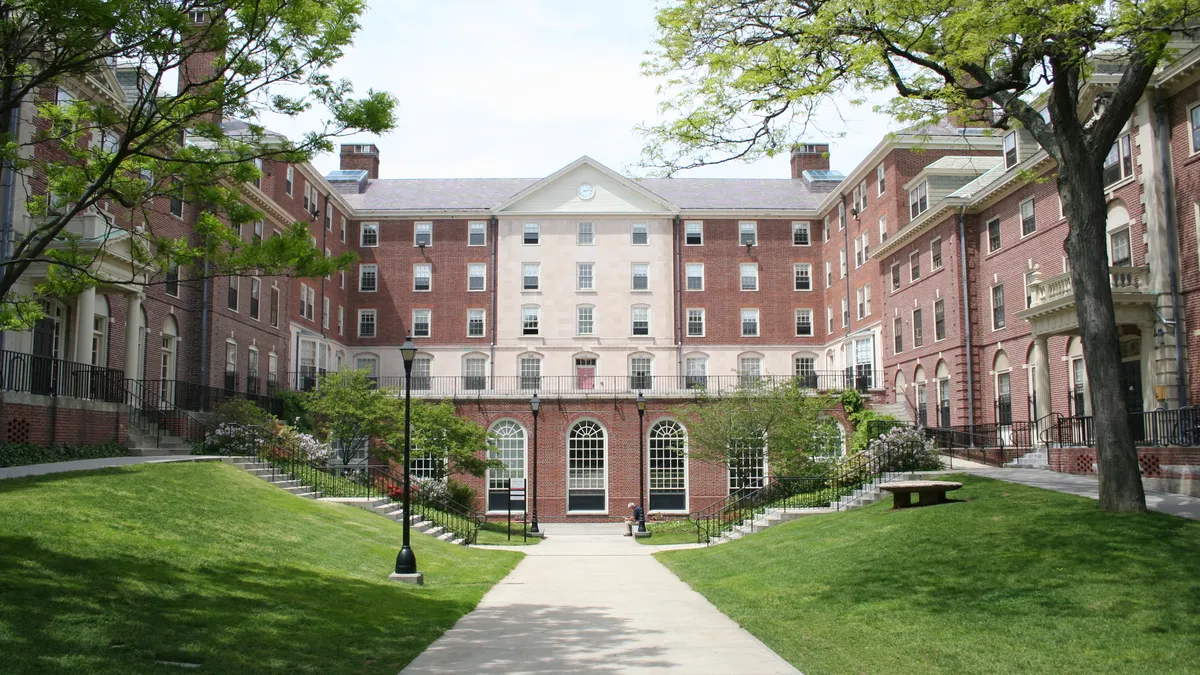Dive Brief:
-
More than a dozen higher education associations are urging the U.S. Small Business Administration (SBA) to loosen the eligibility requirements for a federal coronavirus relief program so more small colleges can qualify.
-
Congress established the Paycheck Protection Program earlier this year to provide loans to businesses with 500 or fewer employees during the pandemic. The loans can be forgiven if businesses spend at least 60% of the funds on payroll and meet other requirements.
-
In a letter to the SBA on Monday, the groups said all student-workers should be excluded from the employee count required to qualify for the program in part because they are no longer on campus and are making many institutions ineligible.
Dive Insight:
The program gives small businesses and private colleges loans with a 1% interest rate so they can continue paying their workers and covering other costs, such as their utility and mortgage bills. The program ran out of its first round of funding in April, but Congress gave it a $310 billion infusion.
Higher ed associations have been advocating for policymakers to relax the programs' eligibility requirements so more colleges qualify. "In many cases, our institutions of higher education are major employers, and that's why these (relief) programs are being set up," said Sarah Spreitzer, director of government relations at the American Council on Education (ACE). "We just want to make sure our institutions can take advantage of these programs."
Last month, the SBA released an interim rule that excludes Federal Work-Study students from the employee totals. In its justification for doing so, the agency noted that these students work part-time jobs in exchange for financial aid they need to pursue their education.
However, in a letter commenting on the interim rule, ACE and other prominent higher ed groups contend that limiting the exemption to Federal Work-Study students leaves out other student-workers who receive institutional aid for their employment. Exempting student-workers entirely would "more accurately reflect the size of the institutions in their roles as employers," they wrote. That, in turn, would help more colleges qualify for the Paycheck Protection Program.
Moreover, colleges sent most, if not all, of their student-workers home earlier this year to stem the spread of the coronavirus, they note.
"We would really like to see (the rule) change," said Sarah Flanagan, vice president for government relations and policy development at the National Association of Independent Colleges and Universities. "We don't want schools that give students jobs to be penalized for that and to be left behind because of that."
ACE also asked lawmakers in a letter last month to explicitly allow public colleges to participate in the program.
The coronavirus has dealt a major blow to U.S. colleges. The massive unemployment caused by the pandemic could raise enrollment by 2% to 4% this fall based on patterns from past economic contractions, Moody's Investors Service predicted in a recent report. But net tuition and auxiliary revenue per student will likely decline between 5% and 13% in the next fiscal year.
New flexibilities in the Paycheck Protection Program could help. Last week, President Donald Trump signed a bill into law that will give colleges and businesses more time to pay back the loans and more freedom in how they use the funds.
For example, businesses now only have to spend 60% of the funds on payroll, down from 75%. They are also no longer required to keep everyone on the payroll to qualify for forgiveness, so long as COVID-19 restrictions are preventing them from returning to previous levels of operations.
That could be the case for some colleges that see enrollment declines or can't resume in-person activities in the fall. "That flexibility will be helpful," Spreitzer said.















